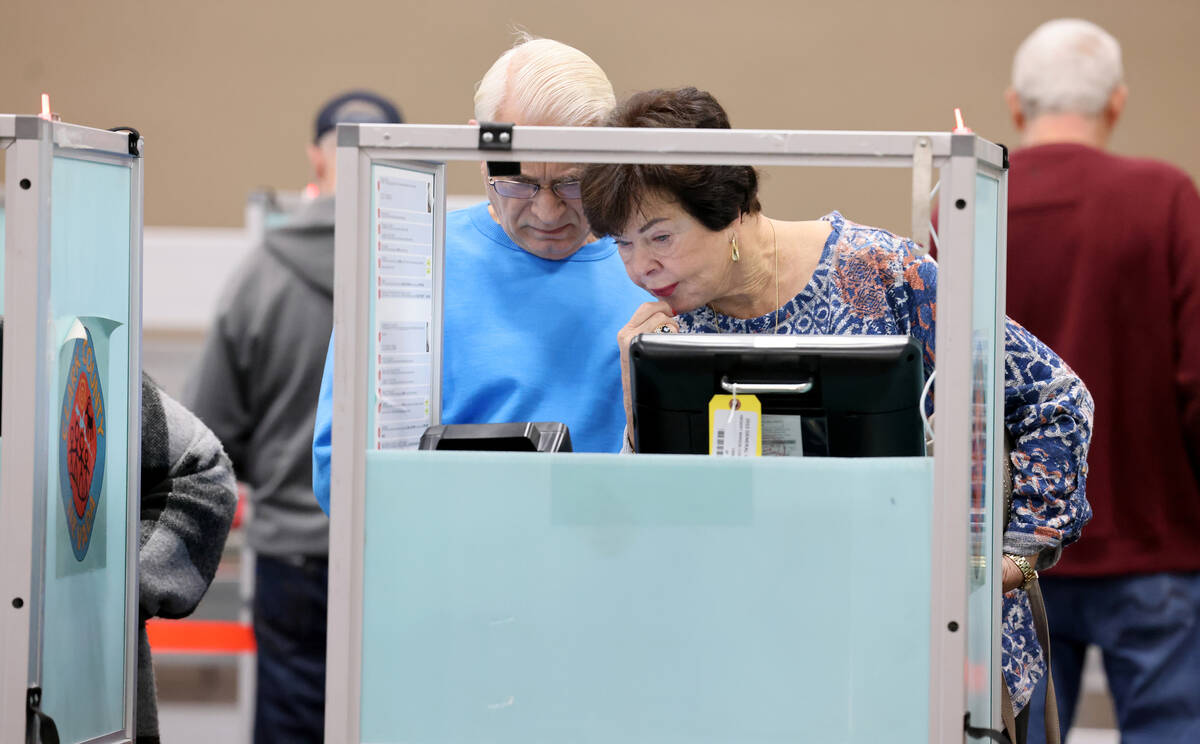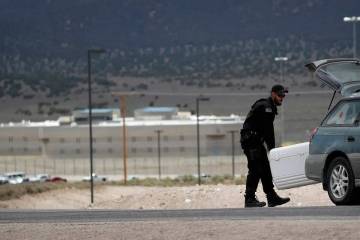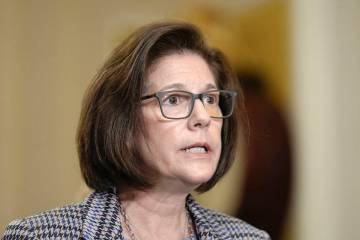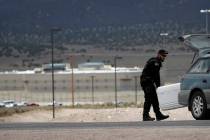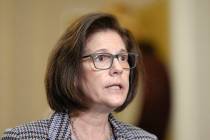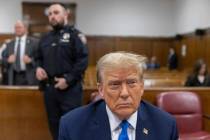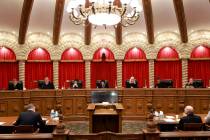The 2022 election, by the numbers
Now that the 2022 election is over, the votes are (finally) counted, and the Supreme Court canvass complete, it’s time to take a look at the numbers and see what we can glean.
First, who was the biggest winner on Nov. 8?
You might say it was Sen. Catherine Cortez Masto, who held on to her seat by fewer than 8,000 votes and less than 1 percentage point. Or maybe Clark County Sheriff Joe Lombardo, who defeated incumbent Gov. Steve Sisolak by more than 15,000 votes and 1.51 percentage points.
But no. The biggest winner — the person who earned the most votes statewide on this year’s ballot in a nonjudicial race — was Democratic Attorney General Aaron Ford, who earned 511,263 votes for his re-election against Republican attorney Sigal Chattah. Not by coincidence, Chattah came in at No. 14, dead last among all nonjudicial candidates.
Ford is also the only statewide Democratic candidate to win more than two counties, narrowly adding Carson City to his total. All other statewide Democrats either won Clark and Washoe, or in the case of Lt. Gov. Lisa Cano Burkhead and would-be state controller Ellen Spiegel, just Clark.
No. 2 on the list of top vote-getters was Republican Controller-elect Andy Matthews, who earned 504,703 votes, followed by Republican Lt. Gov.-elect Stavros Anthony, with 500,944. Cortez Masto was No. 4, with 498,316 and Lombardo fifth, with 497,377.
Oh, and the top vote getters overall? That would be Nevada Supreme Court Justice-elect Linda Bell, followed closely by Court of Appeals Judge Michael Gibbons and Supreme Court Justice Ron Parraguirre, all of whom earned more than 650,000 votes each, but all of whom were running unopposed.
Nobody wins big
In Nevada, there’s a non-corporeal ballot option known as “None of These Candidates,” in certain statewide races, and it’s always instructive to see how None does at the polls. Unlike human candidates, a vote for none indicates disgust, civic apathy or sometimes ignorance of the other names on the ballot.
This year, None had his best showing in the race for attorney general, earning 33,135 votes and coming in third behind the two human candidates, with 3.39 percent of the total vote. None also had a good night in the treasurer’s race, with 28,058 votes, or 2.77 percent. The lowest percentage? The U.S. Senate race, with five human candidates holding poor None to just 12,441 votes, or 1.22 percent.
Oh, but None did great in those single-candidate judicial races, too. Between 23.66 percent and 26.46 percent of voters chose None in races for the Court of Appeals and the state Supreme Court.
Never fear, human candidates: None can’t win a race, even if it gets the most votes.
Doing their civic duty
Credit Lincoln County voters for doing their civic duty the most during the election. Even though turnout is typically depressed during midterm elections, 75.24 percent of Lincoln’s registered voters turned out, with 2,164 people casting ballots.
Lincoln’s civic responsibility did not rub off on its neighbor to the south, however: Here in Clark County, we set the low water mark for the election, with just 51.27 percent turnout, representing 683,687 actual votes.
When it comes to embracing the use of mail ballots, Nye County logged the highest percentage of voters mailing it in at 68 percent. Of course, all voters in Nye County voted using a paper ballot, under a new policy adopted by the county for the general election. That may have prompted people to vote by mail rather than waiting in line during early voting or on Election Day as their fellow citizens filled in all those little bubbles on paper rather than on an electronic voting machine. In second place for the use of mail ballots was Douglas County in the north, at 64.89 percent.
The county least likely to vote by mail? That’s Lander, with just 36 percent of voters choosing mail as a method of voting. Fewer than 38 percent chose to vote by mail in Churchill, Lincoln and Storey counties, too.
Turnout lags
All told, the 54.58 percent turnout this year — with more than 1 million people casting ballots — still lagged behind the last midterm election in 2018, when 62.4 percent of voters turned out, or 975,980 actual people. And that was a harder election, because it was in the days before everybody got a mail ballot sent to them automatically. In 2018, 57 percent of voters cast an early ballot, 34 percent turned out on Election Day but just 9 percent used a mail ballot.
In fact, 2022 saw the lowest general election turnout since 2014, when just 45.6 percent of voters participated. And 2022 was the second-lowest voter turnout in the last 22 years, according to an analysis of figures maintained by the Nevada secretary of state.
Voters also got tired as they worked their way through the races. According to secretary of state figures, 1,080,850 voters cast ballots in the race for U.S. Senate, and nearly as many voted in the governor’s contest. But by the time voters got down to the race for attorney general, just 978,482 total ballots were cast. Judicial races topped out at nearly 894,000 votes. And the voters in Congressional District 2 were the most conscientious: More than 310,000 voted in that district; Southern Nevada’s districts ranged from about 222,000 to 252,000 ballots cast.
Policy powerhouses
Rural Nevada often worries that policy in the state is made by Clark and Washoe counties, and they are absolutely right. A look at the trio of ballot questions shows that what Clark and Washoe want, they get, no matter what everybody else says.
Question 1, the Nevada Equal Rights Amendment, passed only in Clark, Washoe and Carson City, but ended up being adopted 58.6 percent to 41.4 percent statewide. Question 2, the $12 minimum wage amendment, failed in every county but Clark and Washoe, but was adopted statewide 55 percent to 45 percent.
And Question 3 — the open primary/ranked choice voting amendment — had the closest margin, 53 percent to 47 percent. It failed in every county except Clark, Washoe and, oddly enough, Mineral.
If the rurals want to defeat Question 3 when it comes up again in two years, they better start lobbying at both ends of the state now.
And the winner is…
This year the Libertarian Party of Nevada boasted that it had fielded more candidates than ever before, in races from state Assembly all the way up to U.S. Senate. And although the Libertarians aren’t the largest third party in the state — that’s the Independent American Party — its members chalked up thousands of votes statewide.
So which Libertarian got the most votes statewide? It’s not who you may think: The honor goes to Bryan Elliott, the Libertarian candidate for state treasurer, who earned 16,501 votes in his race, even more than gubernatorial nominee Brandon Davis, who got 14,919 or controller candidate Jed Profeta, who earned 15,375 votes.
Close calls
Nevada has a history of close elections, both statewide and locally. Some races even end in a tie, such as in 2011 when candidates Tanya Flanagan and Linda Meisenheimer both tied for second place in a race for North Las Vegas City Council. That race was decided by a high-card draw. (Nevada, baby!)
This time around, no races were that close. The closest contest seems to be the race for Bunkerville Township constable, where incumbent Erik Laub was outpolled by just 32 votes. Kristina Trybul unseated Goodsprings Township Constable Gary P. Rogers by just 104 votes. Laughlin Constable Jordan Ross kept his seat by just 140 votes. In Boulder City, Cokie Booth unseated incumbent James Howard Adams by 133 votes. And, after trailing on election night and for about a week thereafter, incumbent Clark County Commissioner Justin Jones turned away challenger Drew Johnson by just 336 votes. Johnson would have been the first Republican on the commission since 2008.
Jones can still argue his was not the closest commission race, however: The 2020 contest between Ross Miller and Stavros Anthony came down to 10 votes after the election, although Miller insists the official tally after a recount is 15 votes. (The county’s election website still says 10, but the state’s site reflects the post-recount 15-vote margin.) Either way, they were about to break open a deck of playing cards! But it all worked out well: Miller, a former Nevada secretary of state, got to be a county commissioner, and Anthony is heading to Carson City as the new lieutenant governor.
Contact Steve Sebelius at SSebelius@reviewjournal.com or 702-383-0253. Follow @SteveSebelius on Twitter.



